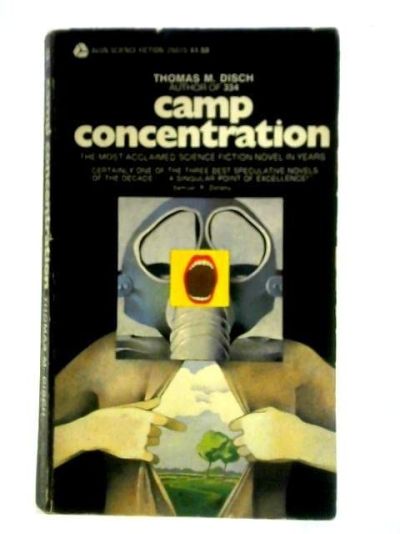Through The Dark Cloud Shining
Camp Concentration
By Thomas M. Disch

9 Apr, 2023
Thomas M. Disch’s 19681 Camp Concentration is a near-future (well, what was then the near future) science fiction novel.
Under President McNamara, America resolutely confronts its enemies across the globe. War! Patriots support the president. Others protest the war on ethical and moral grounds. Such conscientious objectors are given short shrift.
Being married and physically unfit for military service, poet Louis Sacchetti might very easily have avoided any personal involvement in the great conflict. Feeling principle was at stake, he made his objections clear. He was immediately quietly arrested, even more circumspectly tried, found guilty, and sent to prison.
Louis’ stand garnered the attention of nobody of consequence. Well, almost nobody of consequence. There is one notable exception. Louis is suddenly transferred from civilian prison to the very secret Camp Archimedes.
General Humphrey Haast, famously eccentric architect of the Auaui victory during the Pacific War, heads Camp Archimedes. The General believes Louis could be a valuable participant in Haast’s groundbreaking intelligence amplification project. Not only will Louis have the chance to make up for his anti-patriotic stance, Louis’ already impressive intelligence could reach even more impressive heights.
There is just one tiny catch, which has to do with the means by which intelligence amplification is achieved. The project uses injections of “pallidum” to enhance creativity. This is no wonder drug but a unique strain of Treponema pallidum, the bacterium that causes syphilis. This strain has a wonderous effect on human cognition, once it spreads to the nervous system. It is also invariable lethal, killing subjects within nine months or so.
This is an honor Louis would prefer to turn down. But by the time he understands Camp Archimedes’ purpose, it is too late. He has been injected. All he can do is wait to see to what heights his intelligence can soar before the disease’s secondary effects kill him.
Haast was known for a military victory enabled by cutting-edge astrology. Iconoclastic visionary or self-deluding fool? His current endeavor may settle the question once and for all.
~oOo~
Being aware as I am that Disch ended his days shouting at immigrants and Muslims, I don’t know whether certain unfortunate aspects of the novel should be treated as this being a product of its time or a foreshadowing of what was to come. Perhaps the author would have felt the fact that African-American inmate Mordecai Washington outwits Haast more than makes up for what might be seen as regrettable word and plot choices in the narrative.
A more erudite reviewer would lovingly detail all the literary references Disch works into his novel. Unfortunately, the reviewer you have is me, so that’s not going to happen. Probably John Clute has explicated the elements I am going to ignore. What I will say is that traditional SF fans will probably find the second section of the novel hard going.
There are parallels between this novel and Flowers for Algernon. I don’t know whether one of Disch’s goals was to comment on Flowers, or if the parallels are simply because both books involve transitory intelligence amplification and a diary-style narrative.
Disch dedicates his book to John Sladek and Thomas Mann. I am not at all surprised to see Sladek mentioned in the dedication. Camp Concentration is a skillfully executed Sladekian novel, bleak but also often very funny.
Sladekian satire often features people running things who are far less competent than they believe they are. SF often features eccentric protagonists who triumph over conventional science. But in the real world, it is much more likely that what people like Haast interpret as inspiration is instead Third Reich-level crackpottery. Which may produce results, but said results are unlikely to be the ones expected.
Haast isn’t the only Sladekian incompetent in the novel. Readers learn that other projects have had unexpected results. For instance, poorly contained germ warfare has blighted large swathes of the US (if not the world).
There are parts of the country, the West Coast especially, where because of the germ warfare the handshake is no longer considered good form.
One is reminded of the current unpleasantness2. Later developments in the novel recall the AIDs crisis of the 1980s. Traditional SF fans may expect the crisis to inspire the US to embrace rational counter-measures to deal with a new, extremely virulent STD. If so, they are reading the wrong author and the wrong book.
Camp Concentration is available here (Amazon US), here (Amazon Canada), here (Amazon UK), here (Barnes & Noble), here (Book Depository), and here (Chapters-Indigo).
1: Camp Concentration was serialized in 1967 and published in book form in 1968. I don’t know why recordkeepers take first book publication as being the date of first publication.
2: Many folks would say that the covid pandemic is behind us, but … people are still dying of covid. Perhaps the elderly and ill don’t count.
